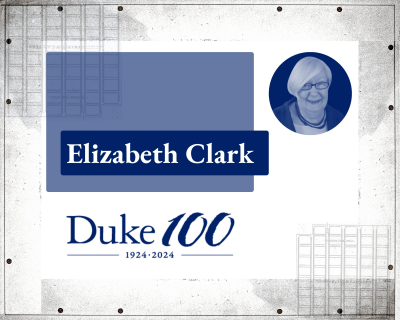Jennifer Knust, Professor of Religious Studies

Elizabeth A. Clark joined Duke University in 1982. Over the course of her nearly forty-year tenure at our beloved institution, she built the Department of Religious Studies into a renowned center for the study of late ancient religions, histories and cultures.
Founder of the Center for Late Ancient Studies, which now bears her name, Clark gathered, organized and coordinated an interdisciplinary group of researchers for lively conversations and in-depth inquiry into the histories, historiographies and theoretical stakes of late ancient studies. At the same time, she pursued and published her own nuanced, extensive investigations of early Christian rivalries, feats of interpretive finesse, ascetic contestations and gendered rhetoric.
A pioneering model for women and an advocate for minoritized scholars, over the course of her career Clark mentored thousands of students, future professors and junior scholars, committing herself to an orderly disruption of a moribund status quo. In the process, she transformed the history of early Christianity into an entirely different field of study.
I first met Liz when I was a graduate student at Columbia University and Union Theological Seminary, her own alma mater. Though I never knew her well, I knew of her — everyone did. She was a mentor to my mentor, and her scholarship has challenged me, again and again, to think in more disciplined, critical and expansive ways.
From her translations of the “Life of Olympias” and the “Life of Melania the Younger” to her study of the bitter quarrels of late fourth-century “church fathers” over the orthodoxy of the third-century intellectual Origen of Alexandria and her ground-breaking examination of the exegetical gymnastics that enabled late ancient Christians to transform biblical texts into an ascetic program, her scholarship enthralled me. And I am not the only one: She built not only institutions but also minds, writing and editing nearly a dozen books, composing nearly fifty articles and book chapters, and founding the “Journal of Early Christian Studies,” the premier North American journal for the study of late ancient Christian thought and practice.
Her former students are now professors in their own right, bringing her ideas, principles, values and strong work ethic to a new generation, each in their own way. Those who were not her students directly will also never be the same. Creative, wise, responsible, funny, tireless, adventurous, passionate and brilliant, she expected a great deal and taught us more.
Liz Clark passed away on September 7, 2021. The night before she died, she was completing her review of the dossier of a fine young scholar and composing a written endorsement of that scholar’s tenure. She sent the letter off in time; that’s how she was. She never tired of mentoring students and colleagues, participating avidly in institutes, centers and programs, reading voraciously, traveling widely and writing constantly and consistently (her last book, a return to the Life of Melania the Younger, was published in 2021).
Clark left an indelible mark locally and globally: Past president of the American Academy of Religion, the American Society of Church History and the North American Patristics Society; recipient of honorary doctorates from the University of Uppsala and Yale University; and honored for her distinguished career by the Board of Trustees (the Center for Late Ancient Studies was renamed in her honor in 2018), her fierce and tenacious dedication to excellence was admired by all.
May her legacy endure into the next Duke century.